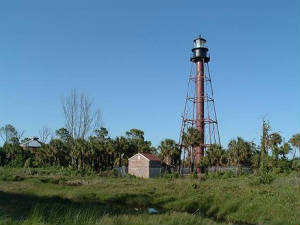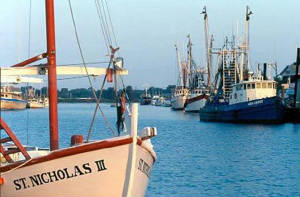|
 |
||||||||||
|
The Local History of Tarpon Springs, Florida
|
|||||||||||
|
The History of Tarpon Springs
Tarpon Springs was
incorporated in 1887. The sponge business was started by two businessmen and
well underway by 1890. One of the sponge industry founders, John Cocoris, and
a native Greek, was very knowledgeable about sponge procurement and processing. By
1905, Corcoris had brought his brothers and many friends from his native Greece to improve on local sponging. Most Greeks came from the Dodecanese Islands in the Aegean Sea. With
successful methods that included rubberized diving suits and helmets the local sponging industry flourished. By 1905, over
500 Greek sponge divers were at work using 50 boats. A Sponge Exchange was created
in 1907. By the 1930's, Tarpon Springs started taking on its present identity
as "the sponge capital of the world," and the sponge industry was having a heyday. The
sponge docks replicated a Greek port city. The sponge industry was the largest
industry in Florida, until the citrus industry surpassed it. But by the 1940's,
the sponge beds were reduced and contaminated by bacteria. And certainly synthetically
made sponges curtailed demand. The industry rebounded somewhat in the 1980's,
as some local beds improved. Today, the "tourist
draw" of this historic Greek sponge industry is the economic mainstay. St. Nicholas
Greek Orthodox Cathedral is modeled after the great Byzantine cathedrals of St. Sophia in Istanbul, Turkey. The current church was built in 1943, replacing the 1907 first church. Anaclote key, right
off Tarpon Springs, is also the northernmost barrier island. The eastern leg
of the protected Gulf Intercoastal Waterway starts inside Anclote Key and goes south all the way to Fort Myers, Florida. The 96-foot lighthouse on Anclote Key was known to the Greek Sponge divers returning
from out in the Gulf as their "Angel of Mercy." The lighthouse was decommissioned
in 1984, but restored and then put back into commission in 2003.  Captain Rick Rhodes is a seasoned sailor who writes guidebooks about navigating waterways of North America and major cities along the way. He is also a realtor based in St. Petersburg, Florida. His websites are: http://www.heronislandguides.com/ (Guidebooks) http://www.rickrhodesguide.com/ (Real Estate) |
|||||||||||
 |
|||||||||||
|
|
|||||||||||
